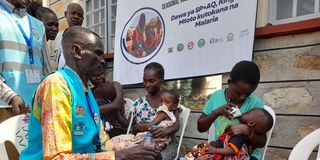First-ever prevention campaign rolled out to curb malaria cases

Mr Joshua Ebei, a Community Health Promoter, administerers sulfadoxine-pyrimethamine + amodiaquine doses to children in Kanam Kemer, Turkana Central Sub-county on June 18, 2024.
What you need to know:
- The treatment will prevent children from contracting malaria when bitten by mosquitoes.
Kenya has rolled out its first-ever Seasonal Malaria Chemoprevention (SMC) campaign through a pilot project in Turkana Central that is targeting children under five years. According to the World Health Organization, SMC is the intermittent administration of a curative dose of antimalarial medicine to children regardless of whether or not they are infected.
The treatment will prevent children from contracting malaria when bitten by mosquitoes.
Community health promoters are administering sulfadoxine-pyrimethamine + amodiaquine doses, popularly abbreviated as SP+AQ, in the sub-county that was classified among the seasonal malaria transmission zones.
Head of the National Malaria Control Programme Keitanny Kibor said they opted for Turkana because of its high disease burden. “Further, research has shown that the seasonality of malaria cases peaks from May to September.” Dr Kibor added: "The objective of SMC is to maintain therapeutic antimalarial medicine concentrations in the blood throughout this period of greatest malarial risk by receiving doses of SP+AQ.”
He said they are rolling out the programme to test its effectiveness in partnership with Turkana County government, Catholic Relief Services , Moi University and Duke University in North Carolina, United States.
"We opted for Turkana North as a control area where SMC won't be rolled out. We will later do a comparison between Turkana North and Turkana Central to establish whether malaria case incidence has reduced. If proven to be working properly, our two research institutions will provide data to back up recommendations for rolling out the project in other parts of the country," Dr Kibor said.
Prof Diana Menya from Moi University's School of Public Health said together with Duke University, they have been conducting research on malaria in Turkana since 2018, with their data having been essential in informing duty bearers that Turkana is highly affected by the disease.
"Our research has informed the planned mass distribution of nets. Some 716,000 nets will be distributed to households across the county as part of the national government's main malaria prevention strategy. After the exercise, we will have strong evidence-based research to inform whether SMC will be part of a nationwide integrated vector control against malaria," Prof Menya said.
She said available data for Turkana Central revealed that children below the age of five are the most affected . "If we protect this age group, which is the most vulnerable, we protect the entire family.”
Turkana Deputy Governor John Erus said the county shares the highest disease burden of malaria in the country at 39 per cent against a national prevalence of six per cent because of its geographical location. It borders Uganda, South Sudan and Ethiopia; resulting in new infections and transmissions due to the movement of pastoralists."Our pastoralists cross over to neighbouring countries; settling in remote areas with wanting health systems. If SMC proves effective, many locals will be protected from malaria.”
County Medical Services Chief Officer Gilchrist Lokoel said being classified as a seasonal malaria transmission area means that some of the prevention strategies that the national government was rolling out to high endemic areas were not being successful in Turkana.
"We are banking on this pilot longitudinal study to generate enough evidence in the fight against malaria as SMC reduces the burden by 75 per cent. This will not only benefit the county but the rest of the country as Turkana and nine other counties contribute to 80 per cent of the national malaria burden.”



